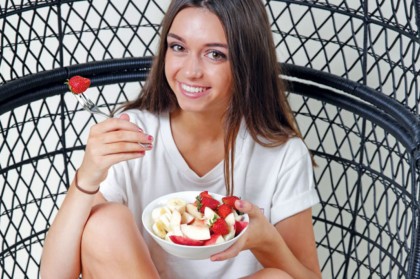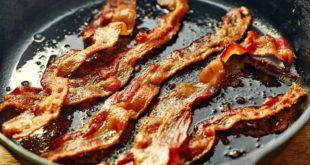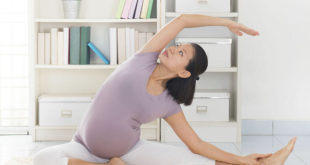
Orthorexia: What the Experts Say
Orthorexia crosses the line from wanting to be healthy to an unhealthy obsession with health,” Louise Adams, a clinical psychologist who specialises in food, weight and body image, says.
Unlike anorexia, where sufferers are consumed by a desire to be thin and fixate on how much food they eat, sufferers of orthorexia focus on the quality of what they eat and live according to their own unique set of restrictive food rules.
“It can be a slippery slope,” Dr Rebecca Reynolds, a nutrition lecturer at the University of New South Wales, says. “It can start with gluten being cut out and then a person hears or reads that sugar isn’t great, so they cut that out too and then they keep going until they get to what they consider a perfect diet, which in fact can be completely unhealthy.”
It isn’t possible to tell whether someone is suffering from orthorexia by looking at their physical appearance, but there are warning signs to look out for. The biggest one is inflexibility and rigidness when it comes to what, when and where a person eats, to the point where it’s negatively affecting their life.
“Many orthorexics will only eat meals they’ve prepared themselves and they will avoid social situations that involve food,” Adams says.
It’s estimated that around a million Australians are living with an eating disorder. Although not yet clinically recognised as such, orthorexia nervosa cases are increasing rapidly. Social media, particularly what’scommonly known as “fitspiration”, is one of the biggest contributors to the alarming rise of orthorexia.
“We’re living in a fat-phobic, health-obsessed, appearance-focused society,” Adams says. “When you combine that with unregulated social media, you’ve got a very scary environment. In fact, in this environment, we’re lucky if we don’t have an eating disorder.”
Reynolds agrees that social media and “Insta-famous” health junkies have a lot to answer for.
“I have a client who’s so confused by all the information out there and has been swept up by the trendy eating styles that are associated with famous people and attractive women on Instagram,” she says. “It’s terrible that really strict lifestyle patterns have been normalised. I’m seeing more and more often how detrimental they can be.”
Just as the path to orthorexia varies, the path to recovery is different for everyone but both Adams and Reynolds agree that taking a break from social media should be part of the process.
“Just like with anorexia and bulimia, the first step is to loosen the strict food rules people have put on themselves,” Reynolds says. “Most people need psychological counselling and to see a registered nutritionist or dietitian to find out what their body needs but there isn’t a one-size-fits-all approach.”
Thomas Grainger ,23, University Student From Sydney
“I was making myself physically and emotionally sick by doing something I thought was making me healthier.
I was diagnosed with anorexia at 14. I was 44kg but got back to a healthy weight at age 16. But when I was 19 I slipped into orthorexic patterns. I became obsessed with listening to podcasts by quasi-health experts and following them on Instagram, where they’d promote their approach to health and diet. My intentions were to achieve better health, and nothing to do with weight.
Orthorexia manifested as a fear of certain foods and what they’d do to my body. One week I’d only eat soy beans because I’d read an article that said they were the latest must-have super food. Then I’d read an article that said they gave you cancer and I’d find another food to be obsessed with. It would change from week to week depending on what was trending. More and more foods found their way onto the banned and “evil” list and it got to the point where I’d only eat organic fruit and veg plus either lean protein, legumes or rice. Soon I was the same weight I was when I was anorexic: 44kg.
Everything I did centred around food. I’d cancel plans with friends if I couldn’t get the food I needed wherever they’d planned on going. Other times I’d go and just not eat, which was awkward. I judged people who didn’t eat the way I ate.
It didn’t seem tiring – it felt like a challenge. I’d have done anything to be healthy. Then I found out I’d developed ulcerative colitis, a digestive disease. I made myself sick by doing something I thought was making me healthier. ‘“Clean eating” gave me a disease.
It’s taken me a long time to find balance. Now I eat what I enjoy and what I feel like eating. It’s the people out there who aren’t talking about food or photographing their food that are the healthiest.”

Ines Smolko, 16, A High-School Student From Melbourne
“All I wanted was a perfect body with a toned tummy and smaller thighs – just like the girls on Instagram.
I’ve never hated my body but I always thought it could be a bit better. I started focusing on my health at the start of last year. It was mostly because of my thighs – I was worried about how big they were getting – and my stomach. Everyone seemed to be talking about healthy eating or going vegan or the paleo diet at school.
I was never trying to get to a certain weight, I just wanted to be healthy, toned and fit.
Every day I’d have to do at least 70 sit-ups. I couldn’t tell you how it made me feel to miss a day because I never did. I’d also go for a run before and after meals to burn off the calories that I’d just eaten. I cut out sugar and processed foods. I wouldn’t eat a lot of bread or have any milk. I decided that those foods wouldn’t give me the body I wanted so I stopped eating them or only ate the tiniest amounts.
I was so tired. All I wanted to do was sleep. I stopped eating around my friends and I’d obsess over pictures of girls on Instagram and Facebook with flat stomachs.
I definitely didn’t think I had a problem. It was my mum that made me realise that something wasn’t right. I’m 170cm and I got down to 45kg, but I still couldn’t see that there was anything to worry about. After going through the clinic program at the Royal Children’s Hospital [in Melbourne], I realise now how unhealthy I looked and how damaging it is to aspire to look like someone you’ve only seen in an orchestrated picture on Instagram. It’s just not worth it.”
Sarah Yp, 35, Numerologist and Soon-to-Be Mother From Brisbane
“I was on the verge of a heart attack and becoming infertile when I finally got help. Four years ago I became consumed by healthy eating.
I was studying nutrition and made a lot of friends who were into healthy eating, veganism and vegetarianism. I gave up dairy, then gluten, and wouldn’t eat anything that wasn’t organic. I also gave up eggs. I was living on tuna, tofu, steamed veg and rice cakes.
It was never about losing weight but I dropped from 72kg to 56kg in months. My stomach was going inwards, my ribs were protruding out of my chest and I couldn’t lie in bed comfortably because my bones were sticking out. But I was high on it. I felt elated, holy almost, because of how virtuously I was eating and how disciplined I could be. All I thought about was eating the perfect meal. Thinking about food all the time was normal. [To say I was] exhausted is an understatement.
I mainly ate at home as I found it difficult to explain my behaviour. I stopped returning phone calls and didn’t talk to anyone. If I hadn’t had a home business, I wouldn’t have been able to get away with it for as long as I did. I could manage to get myself up for an appointment and then I’d go back to lying on the floor and looking at the ceiling.
There were two moments that made me realise I couldn’t keep going. I had an appointment with a friend who was an acupuncturist. She noticed all the skin was peeling off my toes and asked me if I’d been starving myself, as that’s a sign of starvation. Her next words were almost threatening; she told me I had to see a doctor, and I did.
The doctor told me I was heading for a heart attack, which didn’t surprise me because heart palpitations were quite normal for me. Then she said I wouldn’t be able to have children if I kept doing what I was doing. All of a sudden, I felt everything change in my head. I had a reason to get better.
It’s taken falling pregnant for me to get over orthorexia. I now not only need to be healthy and strong for me but for my son as well.”
If you suspect that you or someone you know is suffering from orthorexia nervosa, seek help from your GP.

 We are sharing information for knowledge. Presented by. SocialDiary.Net
We are sharing information for knowledge. Presented by. SocialDiary.Net



